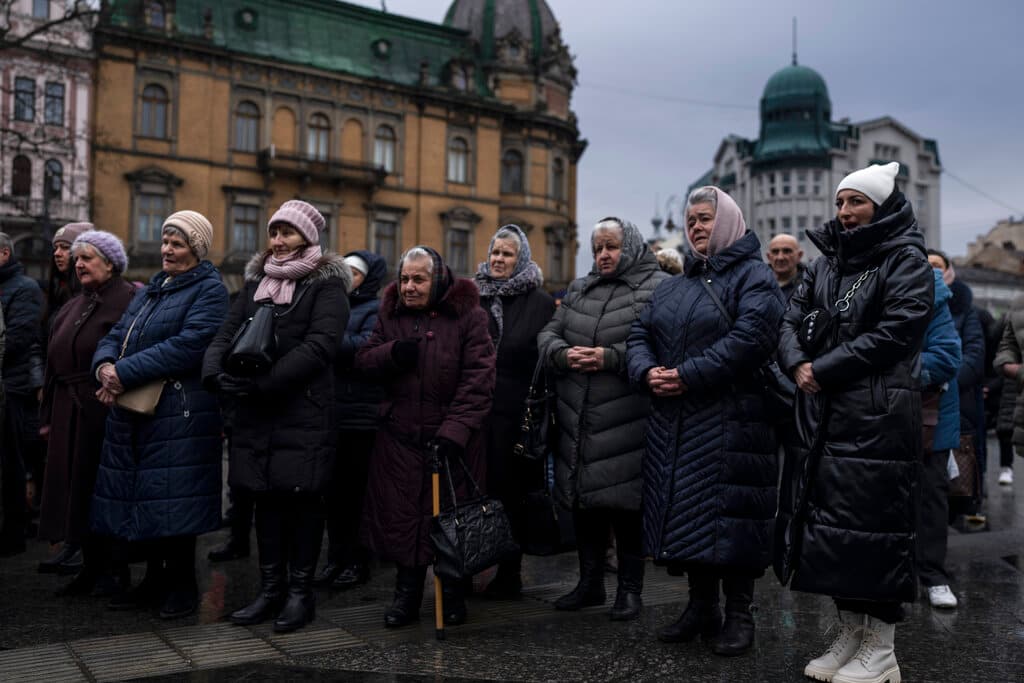Ukraine 2.0? Quietly, Western Europe Begins Push for Peace Talks
Momentum has been building for some kind of resolution to Russia’s year-old war.

Nobody much likes to be nudged, but it appears that, contrary to the desire at Kyiv, a push from Western Europe for peace talks between Russia and Ukraine has begun. The momentum for such dialogue, though it brings no guarantee of resolution, has been building for some time.
On Friday, the one-year anniversary of the Russian invasion of Ukraine, the Wall Street Journal reported that officials from Britain, Germany, and France “have growing doubts” about Ukraine’s ability to reconquer all of its territory. A defense pact between NATO and Ukraine is seen by the Journal as a possible lever to get Kyiv to start peace talks with Russia sometime this year.
Prime Minister Sunak is of the view that Ukraine should have access to more advanced military equipment and weapons once the war ends. He suggested last week that a new plan should be on the table at NATO’s next annual meeting in July. This raises the possibility that more pressure will be brought to bear on President Zelensky in the coming weeks.
Mr. Zelensky and virtually all top Ukrainian officials have been vocal to the point of strident in their opposition to entering into peace negotiations with Russia, at least while Vladimir Putin is still the Russian president.
Given the destruction that Moscow has visited upon Ukraine in the past year, that is understandable. Yet despite the robust pledges of support from Britain and many (but not all) other European countries, the Continent is growing weary of what is now generally agreed to have become a war of attrition, and key aspects of the conflict have become heavily localized.
This is not just in the Donbas. Russia has five southwestern regions that border Ukraine, one of which is Belgorod. According to the independent Novaya Gazeta, Belgorod has suffered more death and destruction than any other place in Russia since the invasion, with more than 50 towns and villages coming under attack from the Ukrainian side of the border.
Those cross-border attacks, about which Ukraine maintains a kind of strategic ambiguity, are of course conscionable given that it is Russia that invaded Ukraine and not the other way around. They are also relatively easy for the Ukrainians to pull off, and when they do it is a long way away from Kyiv, where embassies are open and heads of state can now drop in almost like in the old days.
This throws into question the endless barrages from some prominent quarters that we will — or must — support Ukraine for “as long as it takes.” Yet it could take a lot longer than anyone who is not familiar with the complex history of Ukraine might imagine. President Biden is stumbling over his own state department’s policy, if there is one, on Ukraine, almost as badly as he is prone to tripping while boarding Air Force One.
All this and more is happening as Mr. Zelensky’s international honeymoon could be coming to a close. This does not mean that he is going anywhere anytime soon. It would be, though, naive to suppose that it would be easy to replicate the rapport that blossomed between Mr. Zelensky, the one-time thespian turned global icon, and a former British premier, Boris Johnson.
In recent months Hungary’s Viktor Orban and Italy’s Silvio Berlusconi have been on the outs with Mr. Zelensky. President Macron will go down in history as the man who tried to tame a dictator and failed, and his unapologetic stance vis-à-vis Russia is not lost on embattled Ukraine. Nor would it be correct to think that Mr. Macron is the only game in town in the always coolly detached capital of Paris.
A former vice president of the right-wing National Rally, 41-year-old Florian Philippot, now heads the small French Patriotes party and he is vehemently anti-European Union. He advocates for a Frexit. Mr. Philippot recently told a French television audience that in respect of Mr. Zelensky, “frankly the fundamental interests of the Ukrainian people are not served by this man.”
It is a moment to recall that Charles de Gaulle once pulled France out of NATO’s integrated military command, that there is almost literally a gulf between London and Paris, and that Monsieur Macron is in more than one sense un canard boiteux. As Italy and Sweden have shown, political parties that are on the fringes one day can enter the mainstream faster than foreseen.
As for the United Nations? Phooey. Although it still occupies some prominent real estate on the island of Manhattan, the UN has been conspicuously absent both before President Putin sent his troops into Ukraine and pretty much every day since. Even that deal to get Ukrainian grain shipping out of Odessa again couldn’t have happened without Turkish help.
This week an almost risibly timed new UN resolution called for Moscow to get out of Ukraine — that’s right, it took the vaunted institution a full year to trot out a meek appeal guaranteed to land in the Kremlin’s virtual trash bin faster than you can say “Chinese peace plan.” The UN secretary-general, António Guterres, did visit Kyiv once, back in April, and he said that war is “evil.”

